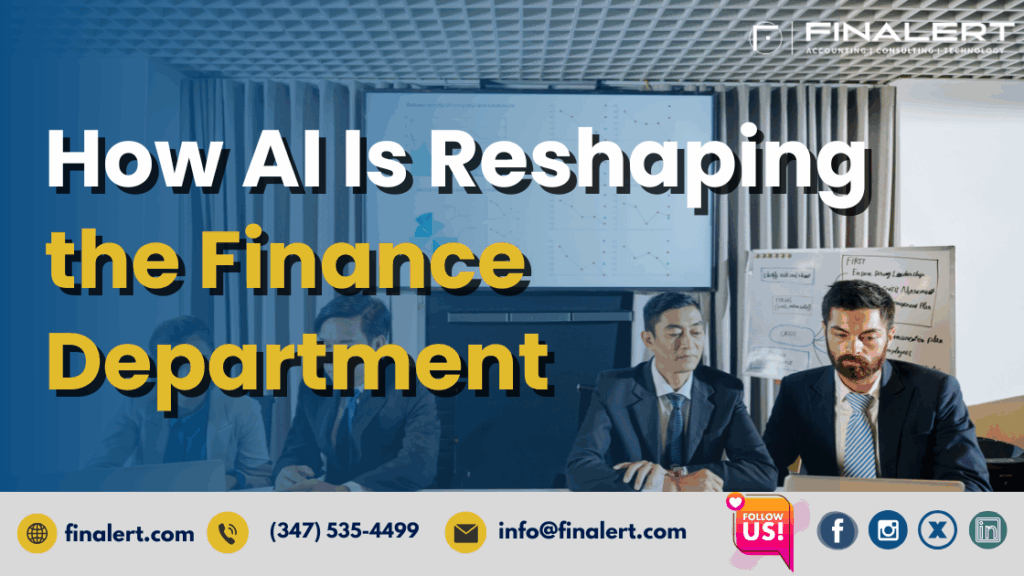
Artificial Intelligence (AI) is fundamentally reshaping the finance department in 2025, transforming how CFOs and finance teams manage reporting, compliance, and strategic planning. Once viewed as a purely operational, back-office function, finance is now evolving into a forward-looking, tech-enabled hub of insights and decision-making.
For U.S. businesses, startups, and mid-sized firms alike, AI is no longer an optional upgrade; it’s becoming a necessity. The technology is automating repetitive work, enhancing accuracy, reducing costs, and enabling finance leaders to shift their focus toward strategy, growth, and resilience in uncertain times. From predictive analytics in forecasting to real-time fraud detection, AI is providing finance teams with sharper tools and a broader influence.
This article takes a deep dive into how AI is transforming the finance department, exploring the immediate benefits, emerging use cases, and strategic opportunities CFOs should embrace to stay ahead in 2025 and beyond.
Historically, finance professionals have spent an overwhelming portion of their time on repetitive, manual tasks—data entry, invoice approvals, reconciliations, and expense categorization. While these activities are essential, they consume resources that could be better directed toward analysis and strategy.
AI-driven automation is solving this pain point by streamlining workflows, reducing human error, and speeding up traditionally slow processes.
For CFOs, accurate forecasting can mean the difference between making informed strategic investments and being blindsided by cash shortfalls. Traditional forecasting models, built on spreadsheets, often struggle to adapt to changing markets and unpredictable variables.
AI introduces predictive analytics that not only use historical financial data but also incorporate external signals such as market fluctuations, consumer behavior, and macroeconomic indicators into forecasts.
Companies using AI in forecasting gain a sharper ability to anticipate market shifts, giving them first-mover advantages over competitors still relying on outdated models.
Today’s business environment is marked by economic volatility, cyber threats, regulatory complexity, and ESG (environmental, social, and governance) pressures. Managing these risks requires continuous monitoring and rapid response, areas where AI excels.
AI enables CFOs to proactively manage threats instead of reacting after issues arise, protecting both profitability and reputation.
Closing the books, consolidating reports, and preparing financial statements are critical yet time-intensive processes. Human error, disparate systems, and fragmented data often lead to inaccuracies that can undermine trust with stakeholders.
Faster and more accurate reporting strengthens decision-making, supports investor confidence, and minimizes compliance-related risks.
AI empowers CFOs to move beyond historical reporting toward forward-looking decision-making. By transforming raw data into actionable insights, AI allows finance to play a more central role in shaping corporate strategy.
Armed with AI insights, CFOs can influence corporate strategy with greater authority, positioning finance as a value driver rather than a cost center.

As AI takes over repetitive processes, CFOs are freed to focus on strategic leadership. In 2025, the CFO is expected to act as a business partner, leveraging financial insights to drive innovation, guide corporate transformation, and communicate with stakeholders more effectively.
While AI brings clear benefits, businesses must also address the hurdles of adoption.
Businesses that manage these challenges effectively will be positioned to reap the full benefits of AI while minimizing risks.
Companies adopting AI early will benefit not only from operational efficiency but also from enhanced resilience, stronger compliance, and greater strategic agility.
AI is no longer a futuristic vision; it is actively reshaping finance departments across U.S. businesses in 2025. By automating processes, enhancing forecasting, improving reporting, and strengthening risk management, AI is unlocking a new era where finance becomes a central driver of strategy and growth.
For CFOs and business leaders, the message is clear: embrace AI to transform your finance function, elevate your strategic influence, and ensure your organization remains competitive in a rapidly evolving business environment. Those who adapt will not only survive uncertainty but also thrive in it.
Similar Articles
No results available
Get in touch with Finalert today for tailored business solutions!
No results available
Ready to thrive? Connect with Finalert today and let’s succeed together in the dynamic global market.
© 2025 Finalert. All rights reserved.
Ready to thrive in the dynamic global market? Finalert LLC offers expert financial services, including accounting, consulting, and technology solutions, tailored to your business needs.
Address
Accounting
Quick Links
Consulting
Industries
© 2025 Finalert LLC. All rights reserved.